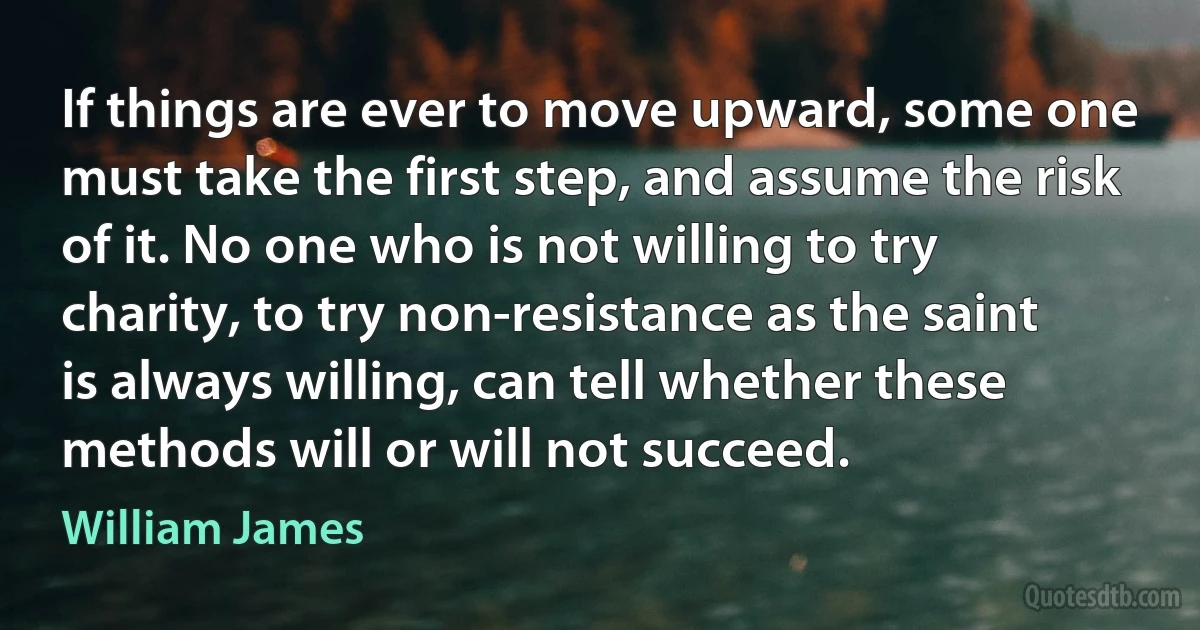Non-resistance Quotes
We must frankly confess, then, using our empirical common sense and ordinary practical prejudices, that in the world that actually is, the virtues of sympathy, charity, and non-resistance may be, and often have been, manifested in excess. ... You will agree to this in general, for in spite of the Gospel, in spite of Quakerism, in spite of Tolstoi, you believe in fighting fire with fire, in shooting down usurpers, locking up thieves, and freezing out vagabonds and swindlers.

William James
What modern apologists call 'true' Christianity is something depending upon a very selective process. It ignores much that is to be found in the Gospels: for example, the parable of the sheep and the goats, and the doctrine that the wicked will suffer eternal torment in Hell fire. It picks out certain parts of the Sermon on the Mount, though even these it often rejects in practice. It leaves the doctrine of non-resistance, for example, to be practised only by non-Christians such as Gandhi. The precepts that it particularly favours are held to embody such a lofty morality that they must have had a divine origin. And yet ... these precepts were uttered by Jews before the time of Christ.

Bertrand Russell
In the year 1884 I wrote a book under the title "What I Believe," in which I did in fact make a sincere statement of my beliefs. In affirming my belief in Christ's teaching, I could not help explaining why I do not believe, and consider as mistaken, the Church's doctrine... Among the many points in which this doctrine falls short of the doctrine of Christ I pointed out as the principal one the absence of any commandment of non-resistance to evil by force. The perversion of Christ's teaching by the teaching of the Church is more clearly apparent in this than in any other point of difference.

Leo Tolstoy
William Lloyd Garrison took part in a discussion on the means of suppressing war in the Society for the Establishment of Peace among Men, which existed in 1838 in America. He came to the conclusion that the establishment of universal peace can only be founded on the open profession of the doctrine of non-resistance to evil by violence (Matt. v. 39), in its full significance, as understood by the Quakers, with whom Garrison happened to be on friendly relations. Having come to this conclusion, Garrison thereupon composed and laid before the society a declaration, which was signed at the time - in 1838 - by many members.

Leo Tolstoy
I know-as we all do-very little of the practice and the spoken and written doctrine of former times on the subject of non-resistance to evil. I knew what had been said on the subject by the fathers of the Church-Origen, Tertullian, and others-I knew too of the existence of some so-called sects of Mennonites, Herrnhuters, and Quakers, who do not allow a Christian the use of weapons, and do not enter military service; but I knew little of what had been done by these so-called sects toward expounding the question.

Leo Tolstoy
The Puritans had accused the Quakers of "troubling the world by preaching peace to it." They refused to pay church taxes; they refused to bear arms; they refused to swear allegiance to any government. (In so doing they were direct actionists, what we may call negative direct actionists.) So the Puritans, being political actionists, passed laws to keep them out, to deport, to fine, to imprison, to mutilate, and finally, to hang them. And the Quakers just kept on coming (which was positive direct action); and history records that after the hanging of four Quakers, and the flogging of Margaret Brewster at the cart's tail through the streets of Boston, "the Puritans gave up trying to silence the new missionaries"; that "Quaker persistence and Quaker non-resistance had won the day."

Voltairine de Cleyre
Where crime exists, force must exist to repress it. Who denies it? Certainly not Liberty; certainly not the Anarchists. Anarchism is not a revival of non-resistance, though there may be non-resistants in its ranks. The direction of Mr. Ball's attack implies that we would let robbery, rape, and murder make havoc in the community without lifting a finger to stay their brutal, bloody work. On the contrary, we are the sternest enemies of invasion of person and property, and, although chiefly busy in destroying the causes thereof, have no scruples against such heroic treatment of its immediate manifestations as circumstances and wisdom may dictate. It is true that we look forward to the ultimate disappearance of the necessity of force even for the purpose of repressing crime, but this, though involved in it as a necessary result, is by no means a necessary condition of the abolition of the State.

Benjamin Tucker


